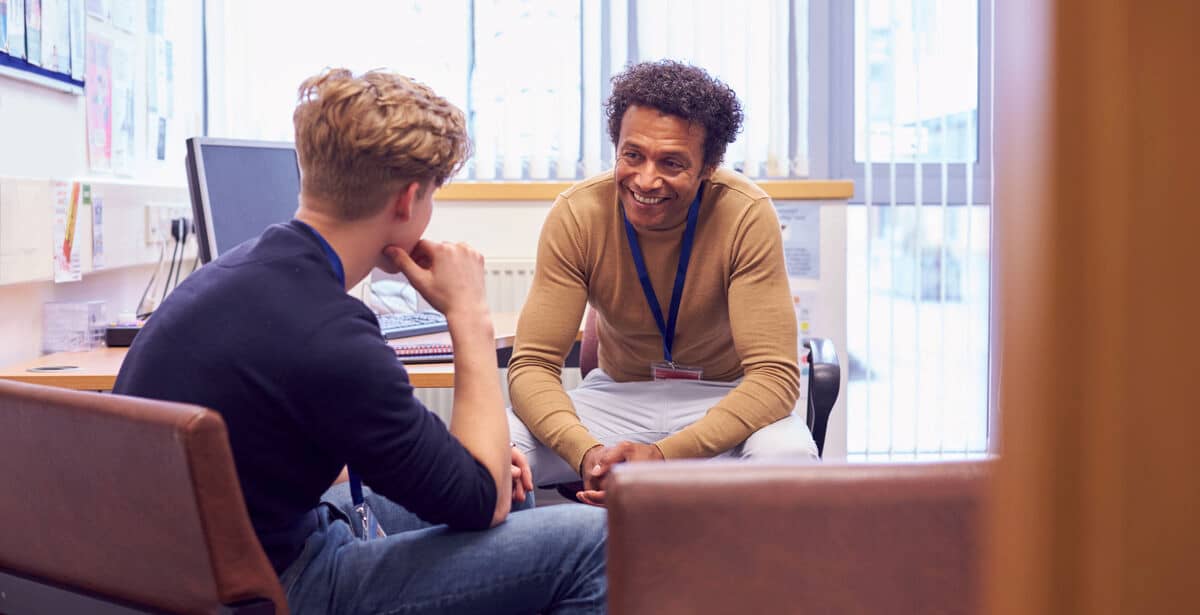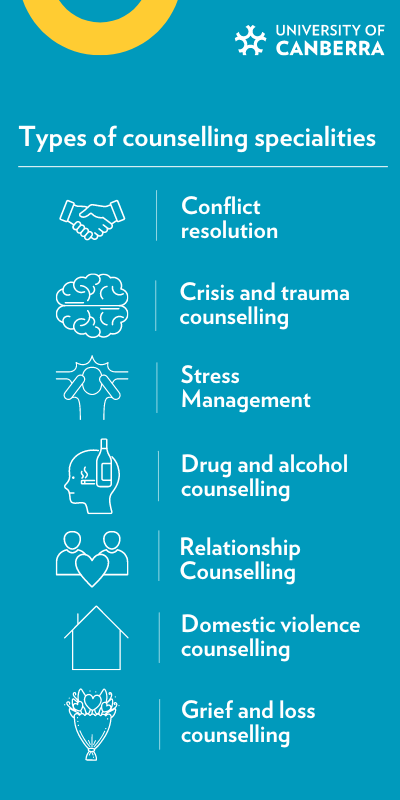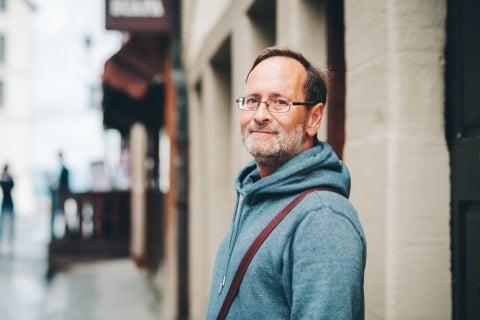What does a counsellor do?

Counselling is one of the most rewarding and satisfying careers out there today, but what exactly does a counsellor do? How do you become one? How much can you earn? And, ultimately, how will you decide if it’s the career for you, especially if it ends up requiring a career change?
Counsellors help people through talk-based, active and expressive therapies. By building professional and supportive relationships with their clients, they work to resolve ongoing problems and provide strategies to deal with future issues. Counsellors do not give advice, rather they work with their clients to enhance existing strengths and find ways to use these in their lives.
Deciding to become a counsellor is a big decision to make, but with the proper training, you’ll be in a position to experience many rewarding career opportunities.
Let us help you discover this exciting discipline and where a degree in counselling can take you.
So, what exactly does a counsellor do?
Everyone faces challenges in life, and counsellors can help guide people through these periods of turmoil and also help them to discover their strengths along the way.
Many counsellors will see clients for a short time to work through a particular problem. Others see their clients long-term, developing a solid relationship with them and helping them delve deeper into behavioural patterns, trauma or insecurities.
Counselling with tailored strategies
Milli Blenkin, Head of Discipline, Counselling at the University of Canberra, says counselling isn’t always a matter of sitting and talking to clients. A counsellor’s responsibilities and duties can vary enormously depending on the setting and the client.
‘If you’ve specialised in working with children,’ she says, ‘you’ll probably have all sorts of arty things and books and teddy bears in your room.
‘You might sit and play blocks with a child, and as you’re playing, the child slowly begins to talk about what’s happening for them. Then you might talk with the child to help work through their thoughts or behaviours. But this is all done with play.
‘And more often than not, you also have to work with the parents to support the child in whatever the issue is.’
Similarly, in an aged or disability-care setting, you might accompany clients on walks or join in on activities and integrate your counselling within these settings.
As you progress through your education and career, you will learn which approaches and methods are most effective in different contexts. You will learn how to give the best possible support to your clients, depending on their age, background or challenges.

What can a counsellor help with?
As a counsellor, you will be trained to deal with a large range of personal problems and issues that people face in their everyday lives or have faced in the past. Higher education in counselling will give you the skills, knowledge and depth of understanding needed to guide people through difficult periods or ongoing issues in their lives.
You may choose to specialise in a particular area or age group opting to focus on children and infants, work with elderly people or specific cultural populations.

Each of these areas requires particular approaches and skill sets.
When working through relationship issues, for example, you may work with your clients to establish their personal values and whether their relationship aligns with those values. Relationship counsellors are able to guide highly charged conversations towards resolutions. They also help partners explore new communication methods by engaging them in role-playing and trust-based activities.
On the other hand, you may use cognitive behavioural therapy to help a client change their patterns of behaviour and achieve their personal goals. In this form of treatment, counsellors will ask their clients to fill out questionnaires, submit written exercises of work, keep diaries and work on experimental therapy tasks.
Working in an institution vs running your own practice
Some counsellors work in private practices and see up to seven clients a day, five days a week. Beyond seeing their clients, they also spend time running their practices. Every day, they manage their teams, their operations and their finances, all while working to grow their businesses. And so, as the owner of a private practice, you will need to commit equally to the needs of your patients as well as to those of your business.
Other counsellors work within public institutions such as schools, hospitals, nursing homes and homeless and domestic violence shelters. They can be called upon at different times, and sometimes appointments fall outside of working hours to suit their clients’ schedules.
For example, many online and telephone-based counselling services, such as Kids Helpline, Gambling Help Online and crisis centres across the board, provide their services 24 hours a day. At these centres, counsellors (sometimes known as line specialists) must be prepared to work well into the night and into the weekend. They provide immediate support and counselling to those in crisis, and while this can be emotionally demanding, the encounters hold life-changing potential.
Who takes on the role of a counsellor?
According to Ms Blenkin, counselling is not about telling a person what to do, and it’s not just about giving advice.
‘It’s learning how to support your client to make a decision that honours their strengths and their situation. It’s all about understanding the situation before you jump in with your perspective,’ she says.
‘Core counselling skills are about listening well, with empathy and non-judgment.’
People who consider counselling as a profession are often empathetic and compassionate and have excellent listening skills. They may have been through difficulties themselves, which is why they may feel inspired to help others overcome personal hardships.
Quality service starts with self-knowledge
Ms Blenkin also says that, along the way, counsellors learn a lot about themselves.
‘All counselling courses will teach you a lot about yourself,’ she says. ‘If you don’t know what you react to or what your values or biases are, then when it comes to listening, you are not going to be aware of what blocks that listening. So another core skill is self-knowledge.’
How counsellors develop their skills
Within the profession, counsellors are expected to continue to develop their skills throughout their career. They are expected to engage with new methods and concepts within their field through research or short courses.
Throughout a counsellor’s career from student to experienced practitioner, clinical supervision is the backbone of counselling practice and skill development. Clinical supervision provides regular consultation, guidance and education. ‘At least once a month, you’ll go and talk to a supervisor — an older and wiser counsellor,’ Ms Blenkin says. ‘You can discuss what’s happening and ask any questions you might have.
‘There might be something your client needs that you haven’t dealt with before. But with the support of your supervisor, you can apply a new technique or tool.’
As a counsellor, you will also get the chance to regularly meet and consult with your peers to discuss the developments, breakthroughs and challenges that you may all be facing. And this can be done in a way where you don’t breach the confidentiality of your clients.
How to become a registered counsellor in Australia
Strictly speaking, you do not need a qualification to call yourself a counsellor in Australia. However, a counsellor without qualifications cannot be registered by professional bodies and will therefore be open to substantial liability and legal risks.
A lack of training in counselling can also pose serious problems when dealing with and offering advice to clients, particularly if they are facing an acute crisis or are at risk of harm.
Studying a tertiary-level counselling course will equip you with the skills, methods and knowledge you need to safely assist and advise clients while also protecting your own security and wellbeing.
Most institutions like schools, hospitals and private practices require some sort of recognised qualification for counselling staff.

How much does a counsellor earn in Australia?
According to Talent.com, the average counsellor salary in 2021 was $94,478 per year. Experienced workers made up to $115,278 annually, while new counsellors started at $84,371.
Due to increased awareness, technological advancements and general education about the importance of mental health and psychological wellbeing, the psychotherapy industry is growing.
Figures from the Labour Market Insights website show that employment figures within counselling alone are likely to grow from 24,400 in 2021 to 27,800 by 2026.
Study a Master of Counselling with UC Postgraduate Online
If you are to embark on a new career that enables you to make substantial, positive changes in people’s lives, or look to develop your skills further as a counsellor, a Master of Counselling at the University of Canberra will provide you with the skills, professional support and expertise you need to excel.
The Master of Counselling is recognised as a professional qualification in counselling and is accredited by the Australian Counselling Association, in line with their Accredited Training Standards.
Study online
The Master of Counselling is delivered online, allowing you to study with flexibility around your personal schedule. The course is led by experts in the field using the most up-to-date material, resources and approaches.
You will also have access to expert clinical supervisors who can support you while you undertake placement units. This means you can graduate with confidence in your counselling practice.
What you’ll learn
In core subjects within the Master of Counselling, you will learn, among other things:
- the major models of counselling and psychotherapy
- an integrative model of practice that reflects on the interrelationships between values, world views and theory frameworks
- crucial interpersonal communication skills
- cultural diversity knowledge that will support you to service a diverse community.
Apply for the University of Canberra’s Master of Counselling or call our personalised advisers on 1300 471 770 today to begin your journey.



